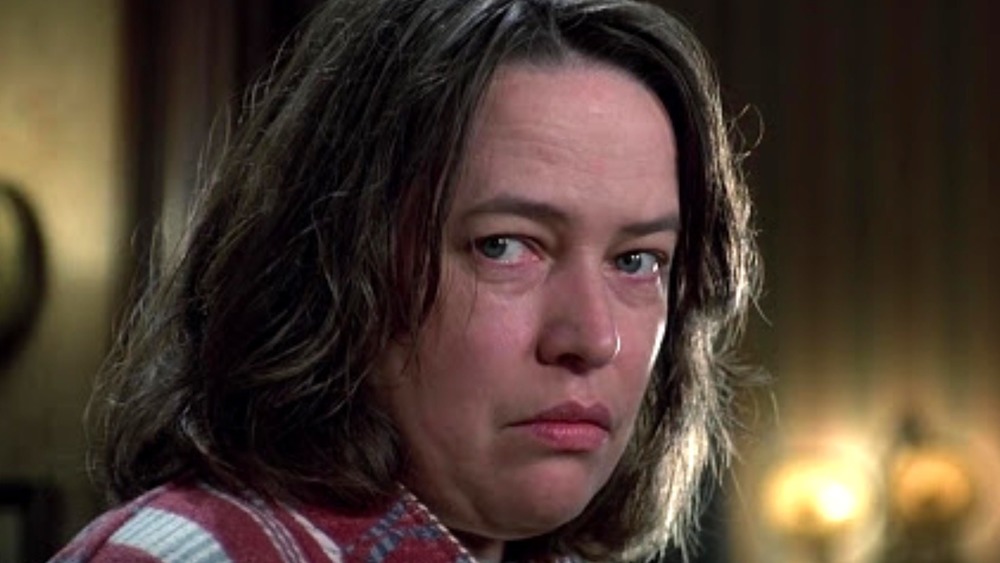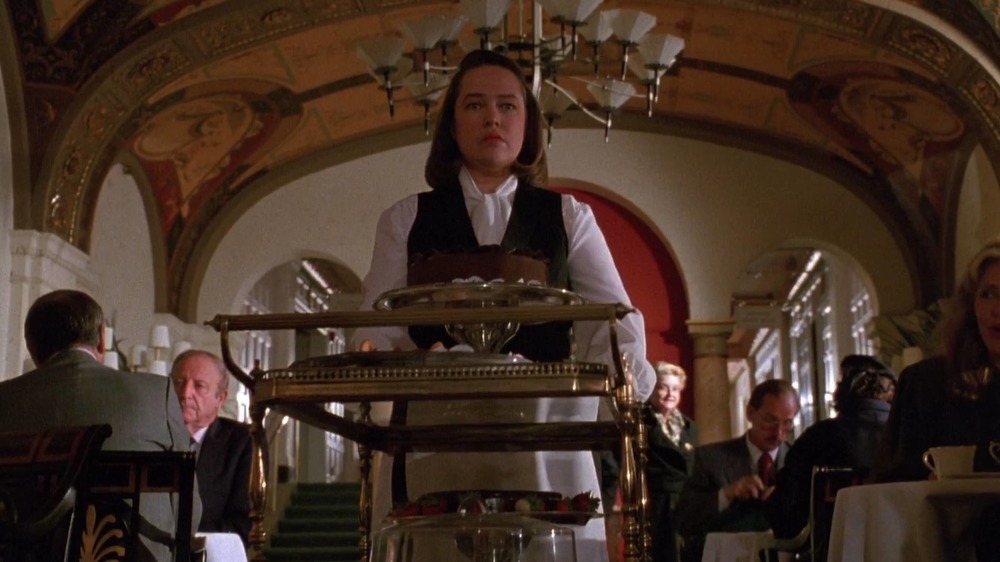The Ending Of Misery Explained
Going on 50 years now, Stephen King has been the undisputed master of horror. From the darkest recesses of his mind, he's frightened generations of people with demonic clowns, supernatural teenagers, and hordes of other creatures from the beyond. But if you ask some people, his most terrifying creation of all is something that's all too familiar today — a superfan.
In 1987, King came out with one of his best books to date, Misery, which was soon adapted into a feature film directed by Rob Reiner and starring James Caan and Kathy Bates. Bates won the Academy Award for Best Actress for her disturbing portrayal of Annie Wilkes. In the film, she discovers that her favorite author Paul Sheldon (Caan) has just been in a horrible car accident, an event that echoes an accident in King's own life. She nurses him back to health but soon learns that he plans on ending her favorite book series, causing her to go insane. She keeps him in bed, even going so far as to crush his ankles, until he writes an ending to the Misery series she finds appropriate.
In an era where toxic fandom is able to spread faster than ever before, Misery has only grown more relevant, and even without an allegorical perspective, the film stands on its own as a taut psychological thriller. But don't worry if the final scene left you scratching your head. We're here to put the story together.
Yes, Annie Wilkes is dead by the end of the movie
The climax of Misery sees Paul finally gain the upper hand with Annie, allowing him to kill her once and for all. In the next scene, we pick up with him 18 months later out to lunch with his agent Marcia (Lauren Bacall). His newest book is drawing hype, and when Marcia asks him if he'd ever write a nonfiction book about the ordeal he went through, Paul says he's not ready for that yet. Then, as he looks to the side of the table, he sees Annie pushing a dessert tray in his direction.
Rest assured, Annie is good and dead at this point, and he soon recognizes her for the harmless server she is. She stops by their table and tells him, "I'm your number one fan," which also happens to be the phrase Annie told him. From the hallucination, we see how even a year and a half after the ordeal, Paul is still traumatized by his experience with one crazy fan.
This ending also provides insight into why Paul isn't ready to write a nonfiction book about his ordeal with Annie. It's clear he's still suffering, and he may not be out of the woods yet. Annie may be gone, but he has plenty of other fans, and who knows if they're just as crazy as she was? The fear may never go away, which ties in nicely to the film's overarching themes.
The ending of Misery shows how people never truly let go of addiction
To truly appreciate Misery, you have to be aware of Stephen King's struggle with drug addiction and alcoholism. In a 2014 interview with Rolling Stone, King stated, "Misery is a book about cocaine. Annie Wilkes is cocaine. She was my number-one fan." Earlier in the interview, he admits to being addicted to the drug from 1978 to 1986, as can be seen repeatedly in his works with protagonists who deal with substance abuse issues, such as The Shining and Christine. With Misery, you can see the connection literally in the way Annie forces Paul to consume painkillers and metaphorically in the way she keeps him strapped in bed all day, unable to move or get anything done.
There's a passage from the University of Pennsylvania Health System that sums this all up: "There is no cure for any of these chronic, progressive diseases. They all require lifelong treatment. Addiction is no different." As people who have been in recovery a long time will say, once an addict, always an addict. Even if a person's clean for 10, 20, or 30 years, there's still always the risk that they could slip right back into addiction, and that's ultimately what Paul's hallucination of Annie at the end of the film represents.
She's dead, he got over the hurdle, and he's been able to thrive for the last 18 months, writing a book in the process. And yet, she still has some power over him. This is evidenced by the moment when Marcia says she thought he was over the experience and Paul responds, "I don't know if anyone could ever totally get over something like that... Even though I know she's dead, I still think about her once in a while."
In the ending of Misery, the monster is dead but still lingers in the back of Paul's mind. Like addiction, it'll always be a part of him.


